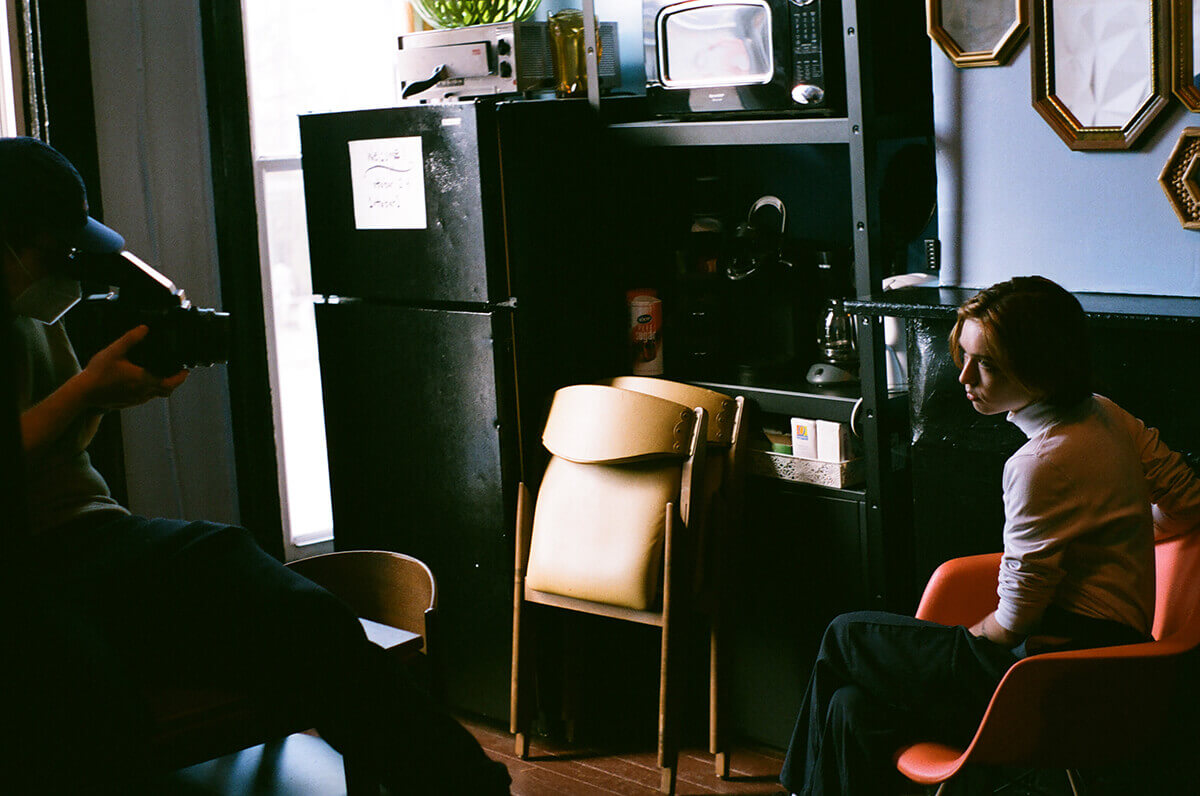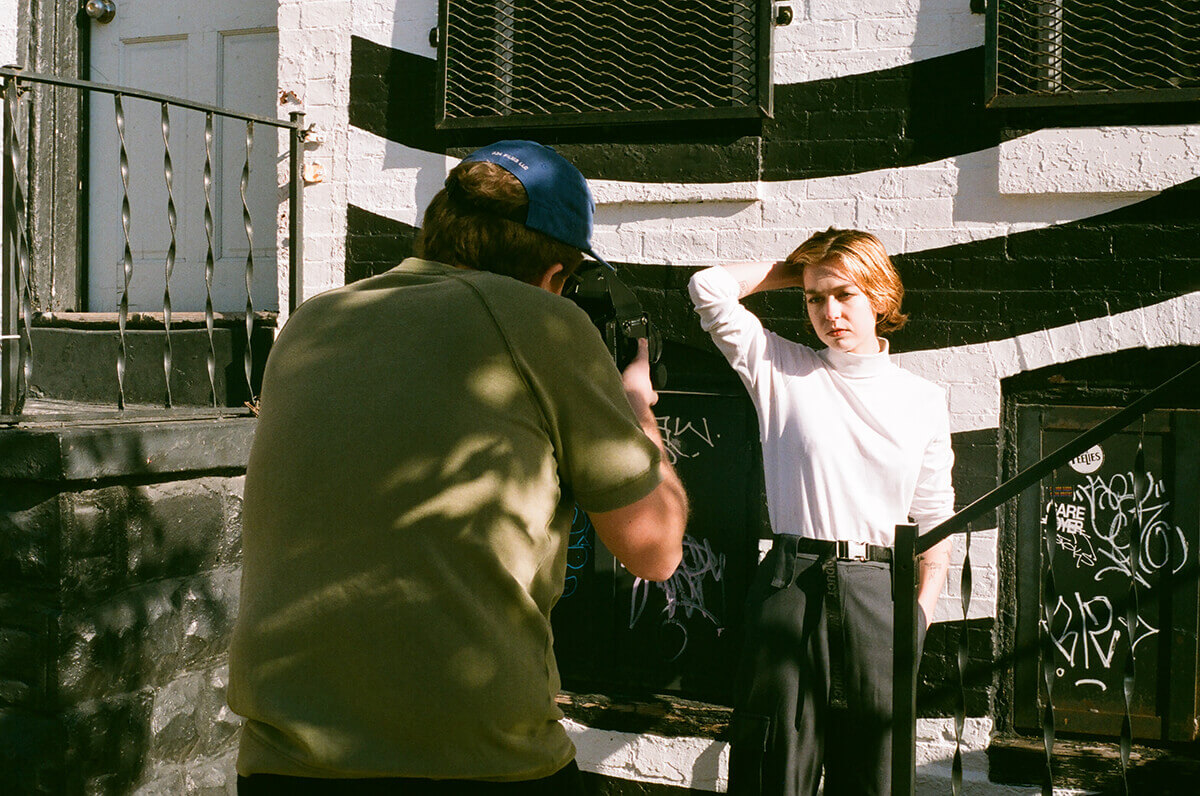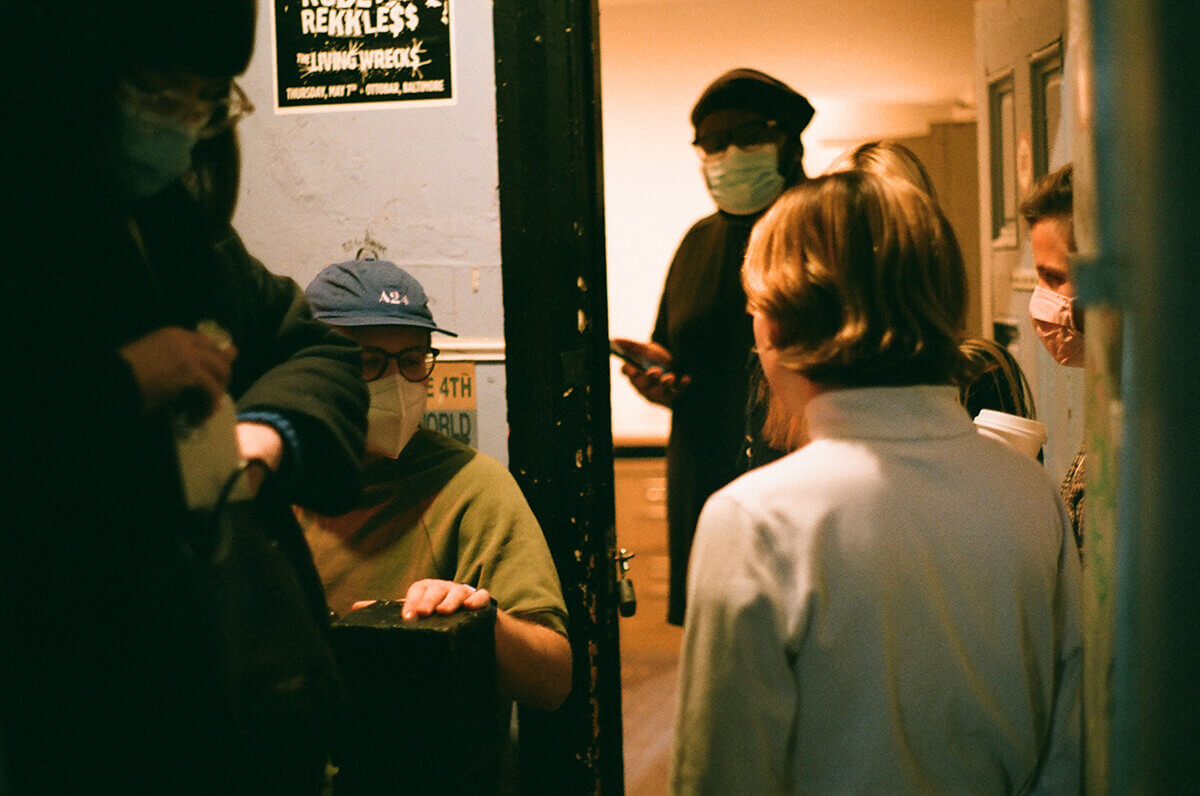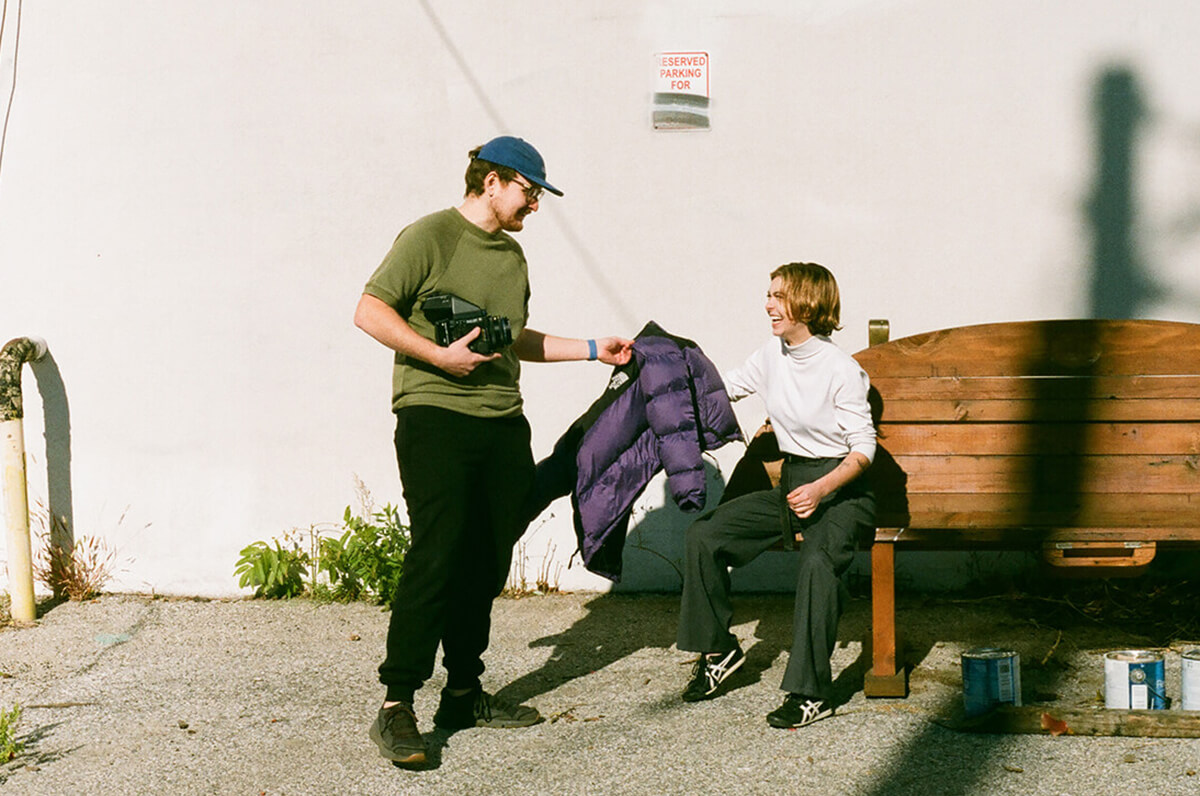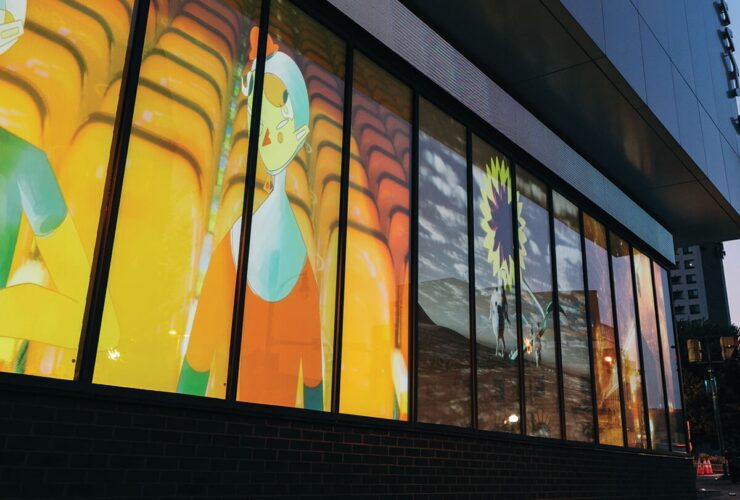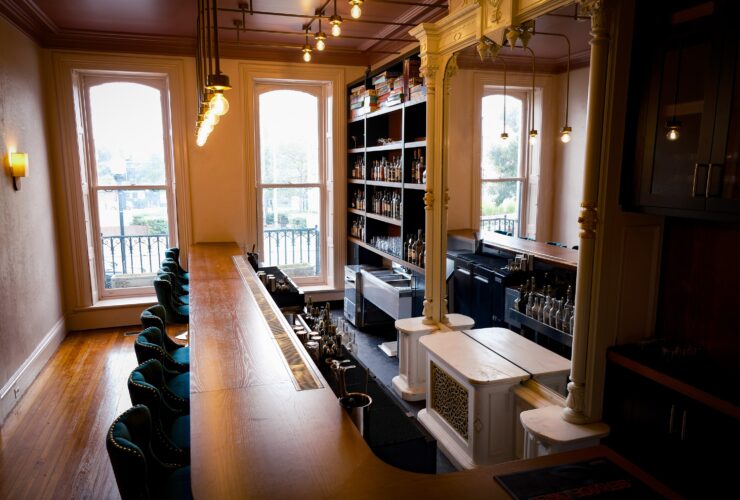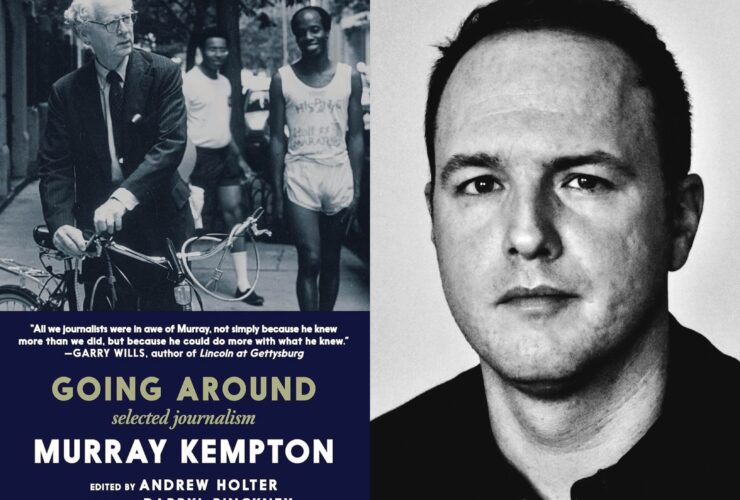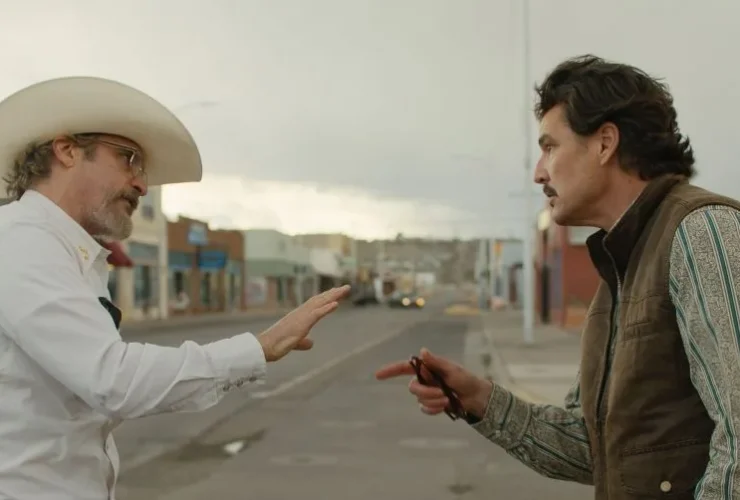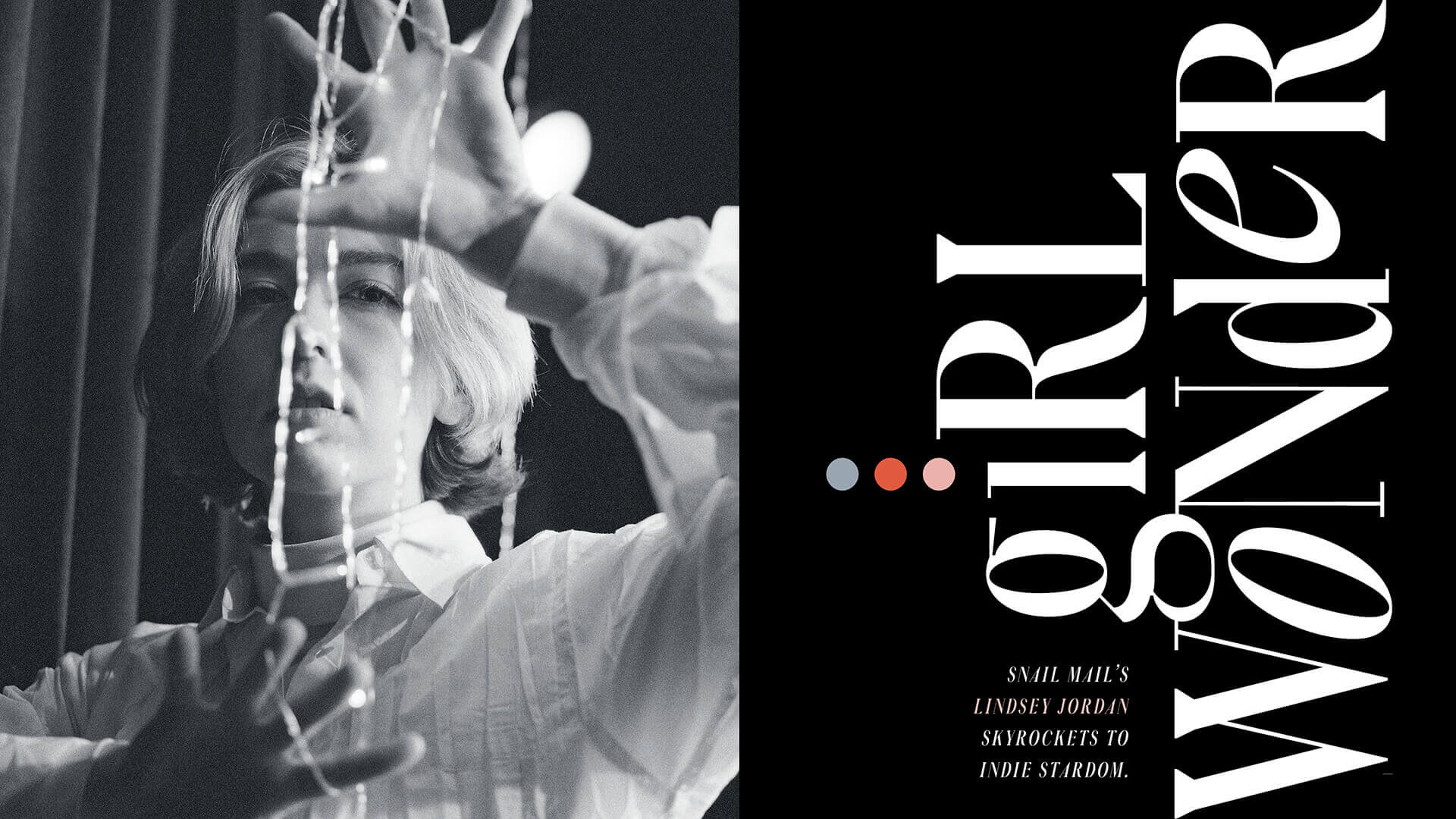
Arts & Culture

By Lydia Woolever
Photography by Micah E. Wood
Hair and makeup by Perryn Morris
Photography assistance by Grace Campbell
Shot on location at the Ottobar and Beyond Video in Remington

LINDSEY JORDAN LOOKS A LITTLE LOST.
At 10 a.m. on the Monday after Thanksgiving, she pokes her head through the side door of the Ottobar with a quizzical look, as if unsure that she’d come to the right place.
She’s been to this veteran Remington rock club many times before, even as recently as two months ago, but not this early, or empty, with the crowds that usually file in under the dusty disco ball either back at work or still in bed after the long holiday weekend.
Then she spots us and walks in.
“Hi, I’m Lindsey,” says Jordan, extending her hand with a casual warmth and half-smile, seeming every bit the ordinary 22-year-old—a backpack slung over her shoulder, dressed in a white turtleneck, vintage blouse, slate-gray track pants, and Onitsuka Tiger sneakers, which altogether feels like a fashion nod to her birth year, 1999—even as a hot-pink photo shoot backdrop awaits her beside the stage.
She’s been home to visit friends and family, catching up on rest in her Ellicott City bedroom, where old Polaroids, concert ticket stubs, and Beach House posters still speckle the turquoise walls, where she practiced her first guitar chords, wrote her first songs, and eventually formed her first indie-rock band, Snail Mail.
“Sometimes I get really depressed and am like, ‘Maybe it’s because I haven’t been to Maryland in a while,’” says Jordan. “I miss it all the time. The nature, my parents’ cats and dogs, driving my car. I am, like, so into driving, which is hilarious, because I live in New York.”
Tonight, she’ll be returning to the Big Apple, where she’ll spend the next few days moving into a new apartment and preparing for surgery to remove the vocal cord polyps that have come to strain her singing. It’s a bit of a nerve-racking moment—with the procedure forcing her to postpone her North American tour, and having the potential to change her voice, though there’s comfort in knowing that Adele and Miley Cyrus have also gone under the knife.
“You know what makes me feel better?” says Jordan, sitting beneath the Hollywood-style lightbulbs of the venue’s backstage hair-and-makeup room. “Julie Andrews had it, and she’s a legend—the queen! I think it’s going to be a good thing.”
Best to get it out of the way, really. Especially as Snail Mail’s star only continues to soar, with Jordan having just wrapped her band’s sophomore album, Valentine, plus a photo shoot with Vogue, and a musical guest set on The Late Show with Stephen Colbert.
At this point, she’s no stranger to bright lights or big cameras, with her likeness plastered across Brooklyn rooftops and in the heart of Times Square. But for a small-town songwriter thrust from Baltimore’s DIY scene into the national spotlight all before she turned 18, it still takes some getting used to.
“The first time I sang, I was like, ‘This is sick’—I wasn’t nervous, I was a bold, brash kid,” says Jordan, recalling one of her earliest sets at a local sports bars around age nine. “I’m way more nervous now.”

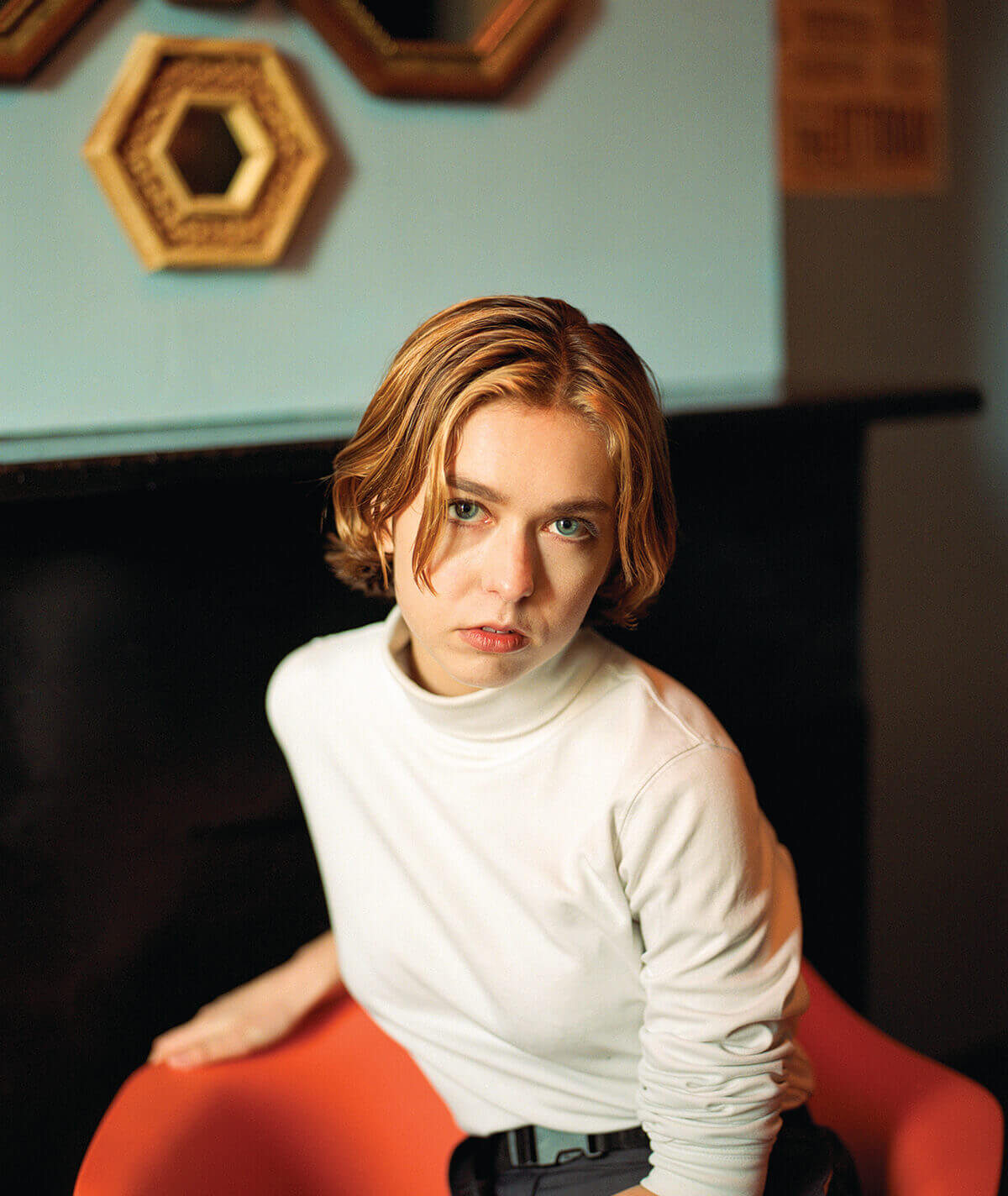
Opening spread: Jordan peers thorugh lights on stage at the Ottobar. Above: Hanging in the venue’s recently renovated green room.
“THE FIRST TIME I SANG, I WAS LIKE, ‘ THIS IS SICK’—I WASN’T NERVOUS, I WAS A BOLD, BRASH KID. I’M WAY MORE NERVOUS NOW.”
Lately it seems like everyone wants a piece of Lindsey Jordan. Which makes sense—she’s a great American rock star story.
Jordan grew up in a quiet, tree-lined neighborhood in the Baltimore suburbs of Howard County. She has one older sister, her mom owns a lingerie store called Bra La La, where her dad handles bookkeeping. Neither parent was musical, but they supported their youngest’s inclination from an early age, buying her a guitar and classical lessons at the age of five, allowing her to play in their friends’ cover band pre-adolescence, and, before she got a driver’s license, toting her to concerts in Baltimore and D.C.
“It was a nice place to grow up,” says Jordan, who is both earnestly serious and charmingly silly, with her youth still lingering in each skaterese dude and for sure. “I’m glad I got the whole good-old suburban public-school upbringing. I liked sports. I loved prom.”
Music was a constant, from performing in church and middle school jazz bands to a theatrical production at Mount Hebron High School. She also played forward on the ice hockey team and spent Thursday nights at the local skate rink, even considering joining a roller derby team after graduation. A quintessential childhood, in many regards—with boredom creating the space for her to blossom.
“So much of being my own person and knowing myself and having a distinct identity has been forming it in the suburbs, you know, because everybody is ‘normal’ and straight and stuff,” says Jordan, who came out to her parents one Christmas during high school. “It definitely creates an ‘I’m different’ complex that can turn into some real originality if you don’t get angry or weird or jaded about it.”
Instead, she focused on her songwriting, which was imbued with all the teenage feels: angst, ennui, and, especially, all-consuming heartache. While she’s spoken about the rock industry’s lack of openly gay female role models during her own upbringing, there were still many artists who offered inspiration, from indie pioneer Liz Phair and Paramore’s Hayley Williams to Baltimore’s Victoria Legrand of Beach House and Jenn Wasner of Wye Oak (not to mention her former guitar teacher, D.C.’s Mary Timony of Ex Hex).
“Dana Murphy is the G.O.A.T.,” says Jordan, referring to the founder of local booking company Unregistered Nurse, who gave Snail Mail its first official concert at the beloved punk-rock U+NFest in 2015.
“As soon as I saw her live that first time, it just clicked—like, oh, she’s definitely going somewhere,” says Murphy, referring to a performance that can still be found in part on YouTube, where Jordan, on a cherry-red Fender, howls low, gritty, gargantuan vocals up into the Ottobar rafters. “It was just that mix of raw talent and the fact that you could immediately tell she considered herself a serious musician.”
WTMD radio host Sam Sessa heard the same thing when he discovered Jordan while searching for new music on Bandcamp, the online music platform where so many young artists self-release their songs. “It’s like walking into a swamp with a metal detector—a lot of rusty nails, but every once in a while, you find a real gem,” says Sessa, who played the first Snail Mail song on 89.7 FM in May 2016, two months before the release of their Habit EP, with its defining single, “Thinning,” written when Jordan was just 15. “Lindsey has a way of tapping into feelings and experiences and channeling them into her music in a way that’s so rare, especially for someone her age. It is just instantly relatable. It strikes a chord with people.”
By the time the station invited her in for a live show the following spring, Jordan, now a bleach-blonde high school senior, had already toured with D.C.’s post-punk Priests and performed at the SXSW festival, flanked by friends-turned-bandmates, bassist Alex Bass and drummer Ray Brown. An NPR Tiny Desk Concert and a Matador Records deal were not too far behind.
“She’d already become indie famous—it happened that fast for her,” says Sessa, who remembers label scouts in the Towson studio’s sold-out audience. “And less than a year later, The New York Times is calling her a rock star.”
“It kind of just came out of nowhere,” says Jordan. “I was a high schooler. I had plans to go to college. I wanted to write. I was kind of not thinking about it like, ‘Oh man, this is going to be my career.’... Then there started being label and manager and agent offers, and finally there were resources to record. It was super overwhelming, but also the most exciting thing—ever.”
In 2017, she got her high school diploma, Bass and Brown dropped out of college, and the trio got to work on their debut album, Lush. Rave reviews poured in for its 10 tight, triumphant tracks, lauded for their wise-beyond-years lyrics and reverberating guitar, cementing Snail Mail’s status as the next great indie-rock darling. Jordan was hailed a “prodigy” on more than one occasion.

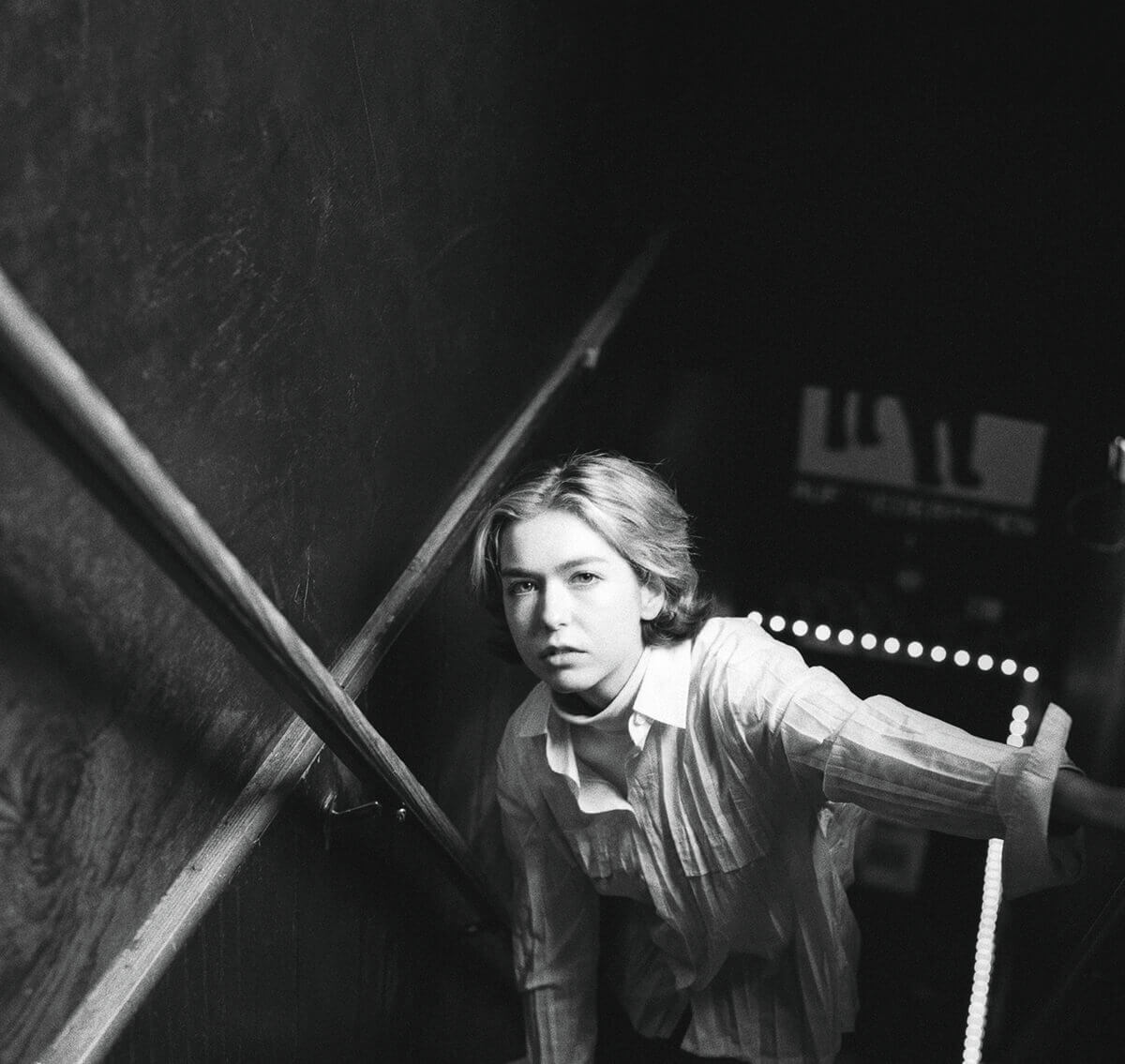
This was a time when a number of young female musicians had begun climbing the ranks of rock ‘n’ roll. That fall, Jordan was included in a Times feature titled “Rock’s Not Dead, It’s Ruled By Women,” which declared that a new generation of “female bands are making some of the most urgent, politically relevant music around,” including other indie artists like Soccer Mommy, Sheer Mag, Vagabon, and Waxahatchee, who Jordan considers a friend and mentor. As Sessa says, Jordan seemed like “the tip of the spear.”
But from a flash in the 1970s punk scene to the trailblazing Lilith Fair era of the 1990s, this wasn’t the first time that tastemakers had mused about the future being female for a genre forged by men in the 1950s.
In fact, a 2018 University of Southern California study sent shockwaves throughout the music industry when it reported that, of the top songs on the Billboard Hot 100 over the last six years, a mere 22.4 percent were performed by women (with only 12.3 percent written and 2 percent produced by them). That awards season sparked the hashtag #GrammysSoMale and record labels promised change, but when new figures came out last spring, they remained largely the same, if not worse. Today, only 7.7 percent of Rock and Roll Hall of Fame inductees are women, and the disparities leave female musicians frustrated over the persistent focus on their gender.
“There’s a lot of ‘You go, girl!’ energy out there right now, and, in a way, it’s kind of infantilizing,” Jordan told us in 2018. “It puts forth this idea that girls are born with an actual disadvantage. In music, young girls are not encouraged to play the guitar, and I definitely grew up in gaggles of boys, struggling to figure out what it meant to me to be a musician and a guitar player and where I stood in the equation.”
Jordan’s music spoke for itself, with Lush landing the band opening gigs for veteran indie artists such as Kurt Vile, Mac DeMarco, and Parquet Courts, plus a spot on the Coachella lineup and their own world tour. She had already started writing songs for Snail Mail’s second record when COVID-19 hit in 2020, sending her back to her childhood bedroom, where she read books, played Xbox, and fleshed out melodies on a new Minilogue synthesizer for much of the pandemic.
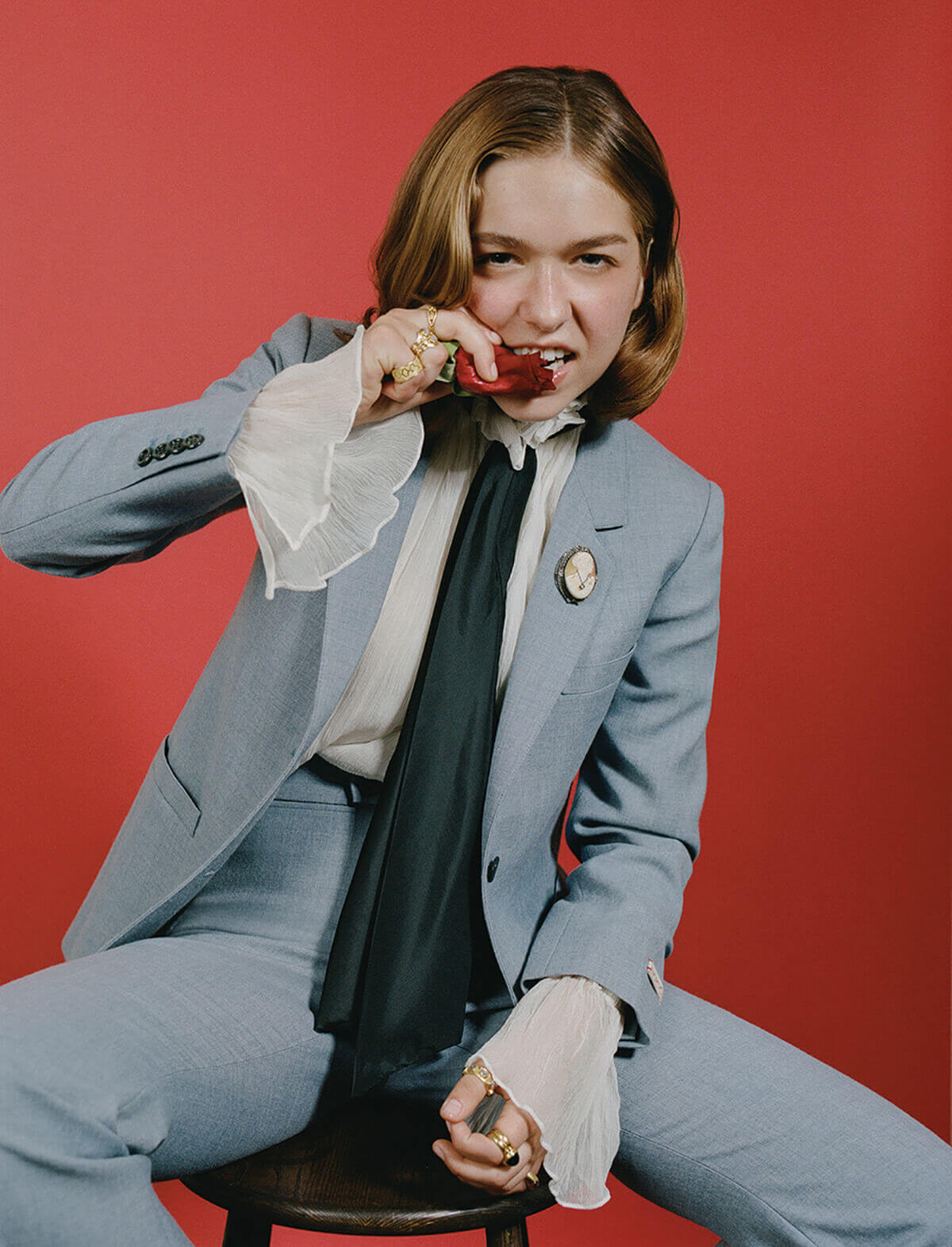
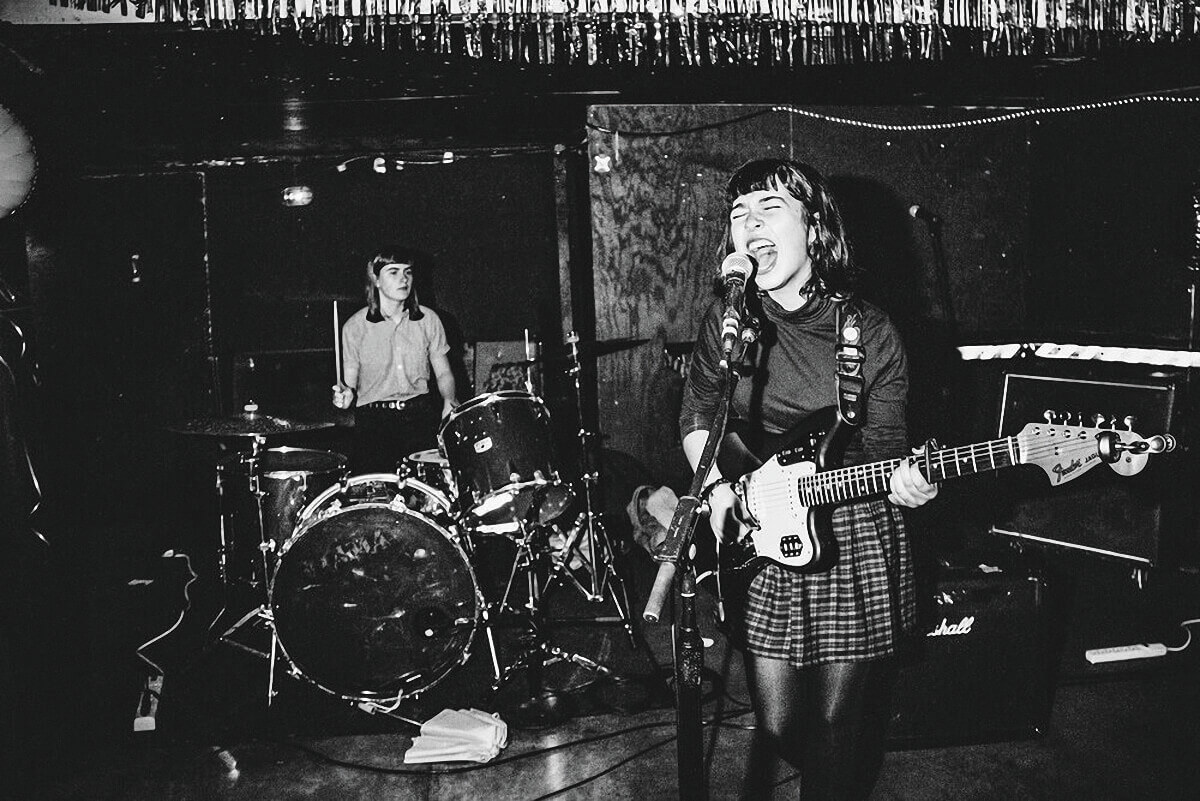
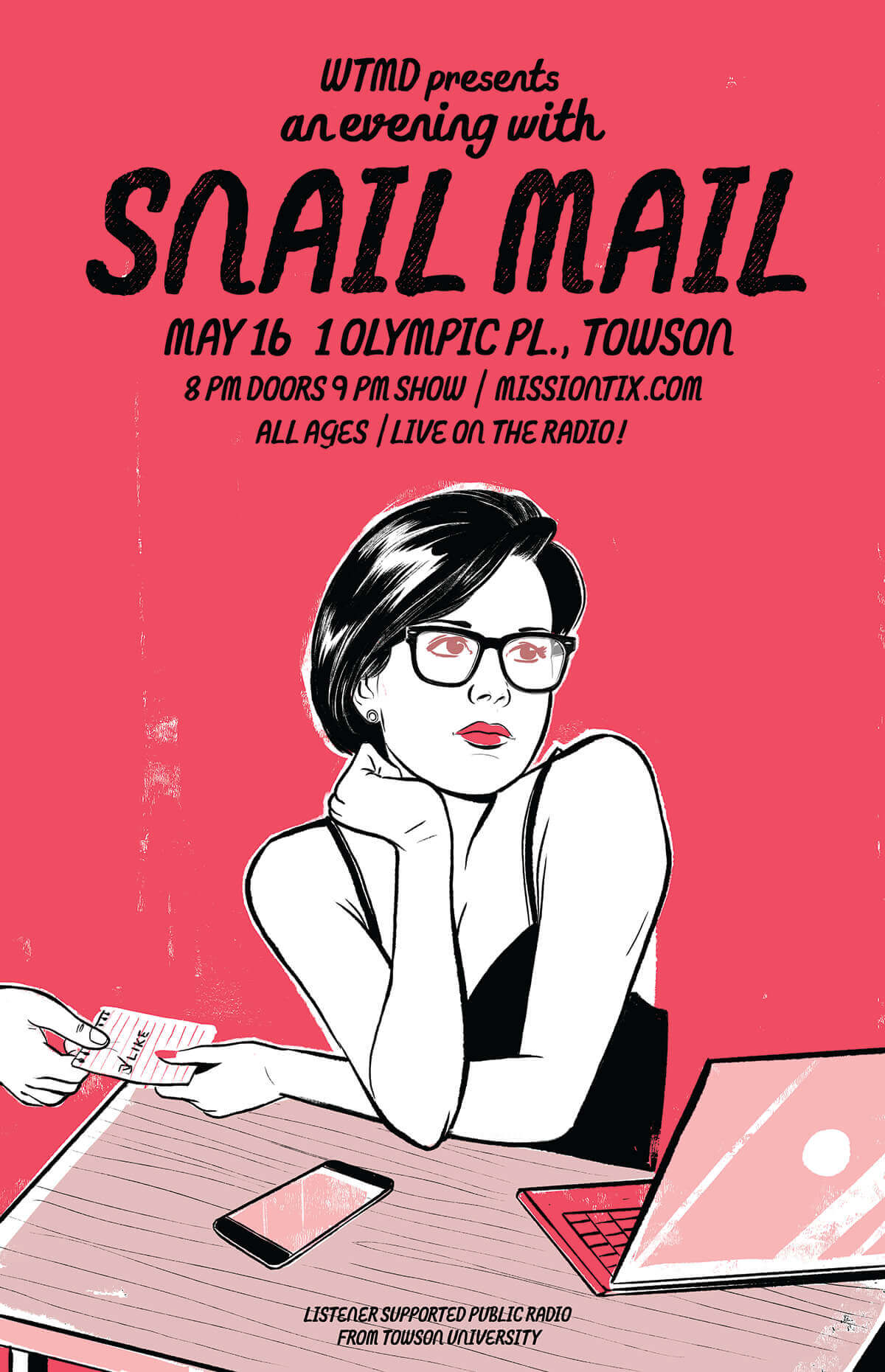
JORDAN PHOTOGRAPHED FOR VALENTINE, COURTESY MATADOR RECORDS; SNAIL MAIL PERFORMING AT U+NFEST IN 2015; A POSTER FROM THE BAND’S WTMD CONCERT IN 2017, ILLUSTRATED BY BALTIMORE ARTIST ALEX FINE.
“All of a sudden, I had all this time—and quiet,” says Jordan, who found herself working through the night, delving deeper into themes of love, loss, and life-changing success. “I’m superstitious about the fact that I’ve basically written all of my albums in that room. It’s a self-fulfilling prophecy, like, shocker! Of course I’m writing my best songs here at my parents' house.”
“LINDSEY HAS A WAY OF TAPPING INTO FEELINGS AND EXPERIENCES AND CHANNELING THEM INTO HER MUSIC IN A WAY THAT’S SO RARE...”
During this time, she also spent 45 days in an Arizona rehab, which she references on the record’s bass-heavy second single, “Ben Franklin.” While private about the circumstances, she alludes to the navigational challenges of sudden fame at such a young age. “I just had a lot of really crazy experiences in the year leading up to it,” says Jordan. “I needed very distinct professionals to know what I was going through; people around me were like, ‘I don’t know how to help you, dude.’ . . . Entering into something like this, I was nervous, I felt depleted, disappointed about a lot of things in the music industry. I was getting a little negative.... I have a way different mindset now, and the mental health education of, like, a junior professor.”
Which can’t hurt, as Jordan admits to putting an “inhuman” amount of pressure on herself. The self-proclaimed perfectionist refuses ghost writers, has a heavy hand in production, and conceptualizes her own music videos, like Valentine’s title track Victorian bloodbath, inspired in part by her love of horror films. She taps into an encyclopedic knowledge of pop culture—be it cinema (her album cover was originally going to be an ode to John Waters’ Cry-Baby before pop star Billie Eilish released hers featuring a single tear), music (from Bill Evans to Nirvana), or literature (like Ocean Vuong or E.E. Cummings)—and incorporates it, and every decision, into her music with great intention. Her diction is deliberate, her chord arrangements meticulous, all shades of a five-year-old who forced herself to practice guitar for two full hours every day.
“I am not a big fan of help,” says Jordan. “I’m very in touch with myself, about why I’m in the position I am, and why I even like doing it. It’s very much because I’m a writer and I love music. . . . It comes off a lot more complicated now, but everything else is kind of silly to me.”
Between an onslaught of interviews, she tries to avoid the press, and the internet, for that matter, as she takes criticism to heart, especially since each song carries such a personal meaning. Feedback is sought from her bandmates, who still reside in Maryland, where their basement serves as the band’s practice space.
“It’s taken me years to put into words how special Lindsey’s songwriting is, and I still haven’t been able to do it,” her drummer, Brown, told The Washington Post in 2018, noting a “weight on her shoulders.” Neither he nor Bass was available for comment.
“I don’t know if I would be as happy if Alex and Ray weren’t in the band, because they’re like my best friends,” says Jordan. “I trust them. They’re honest with me. We’re definitely a team. Our crew is bigger now, but it’s all within the homie network. No randos or old heads. The audition process for new members is 90 percent, are they cool? You never want a weirdo in the van.”


Actually, Snail Mail gets driven around in a tour bus these days, but the band did haul itself up and down the East Coast and around the country in the early days, one time breaking down in Orlando on the way to Austin, booking its own shows along the way.
This bootstraps ethic, born out of the all-encompassing Baltimore DIY scene, has undoubtedly helped the band cut its chops for bigger stages. The first shows were performed as teens at small Station North clubs like The Crown and The Windup Space. In September, as fresh-faced twentysomethings, they’ll play the 2,000-person Fillmore in Silver Spring.
“We played a lot of house shows, we slept in basements,” says Jordan. “I feel self-righteous about the fact that we were really a DIY band. I just see the difference in how it teaches you—how to book shows, how to pay the opener fairly, how to assert yourself. I have a lot of respect for people who can create something out of nothing, and that’s a big part of what we were doing.”

While Jordan is admittedly out of the loop with the latest local lineups, a number of Baltimore artists stay in her rotation, from Horse Lords to Lower Dens to JPEGMAFIA, who she’s run into on the road. When in town, she has been known to hit the bins at The Sound Garden in Fells Point, where she held her album release party in November, even collaborating with The Charmery to create her own special ice cream flavor for the occasion: strawberry, rose, and marshmallow with chocolate cake chunks and chocolate chips, with a portion of the proceeds benefitting local antiviolence program Safe Streets. She also loves Hunting Ground and Atomic Books in Hampden, and, though it’s been a while, the Sip & Bite Diner in Canton, relishing her relative anonymity here, though people still recognize her and ask for the occasional autograph.
“It’s cute, I like it—it feels genuine,” says Jordan of her Maryland fans, with Manhattan folks more likely to snap less subtle photographs, which she imitates in an awkward close-to-the-chest phone hold. “I can see it from a mile away.”
Those interactions will likely become more frequent in the days and months ahead, as this winter, Valentine made more than a dozen end-of-year lists as one of the best albums of 2021. But for now, she’s heading out into an empty Remington parking lot by herself on a bright, brisk afternoon—no managers, no agents, no entourage. If all goes well, she might see a concert with a friend in New York tonight. But she’ll be back in Baltimore soon.
“I’m sure!” exclaims Jordan, her coat tucked under an arm and her slicked-back hair windswept as she walks off into the sunlight—knowing exactly where she’s going.
